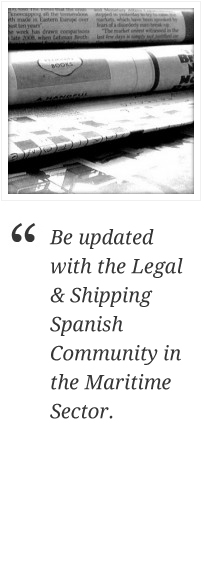June: CIRCULAR 2A / 2008
VESSEL DETENTION FOLLOWING PSC INSPECTIONS AND SANCTIONING PROCEDURE: MORE INSPECTIONS AND HIGHER GUARANTEES
Following the information provided in our CIRCULAR. 4A/2003, Spanish Government has been strictly applying Royal Decree 91/2003 concerning PSC inspections, which has make Spain move out from the PARIS MOU Grey list countries, where she was in 2005.
In year 2006, a total of 2,166 vessels (of the 6,218 foreign vessels calling to Spain) were inspected, which inspections resulted in 188 vessels being detained. That is less than a 10%. As concerns each port, only at the Port of Barcelona 54 PARIS MOU inspections were carried out, of which 9 general cargo vessels were detained.
This percentage increased during the last year 2007. For example, only at Port of Castellon the amount of vessels detained increased by 30% in comparison with the year 2006. In February 2008, 14 vessels were detained at Spanish Ports.
The vessels targeted by PSC Inspectors are those with flags from non European Community countries, such as Panama, Antigua and Barbuda, Singapore, and Turkey, although vessels from European Community countries such as Malta and Bulgaria are also closely monitored. The vessels detained are usually bulk carriers, general cargo (used for short sea shipping), ro – ro and ferry vessels as they usually offer a low cost service reducing the investment in the vessel’s maintenance
The main deficiencies detected are basically problems with light systems, shapes and sound signals; oil filtering equipment, crew certificates, fire equipment, communication systems, cleanliness of engine room, problems with the safety and security signals and equipment.Â
Following a PSC inspection in Spanish Ports, the Harbour Master can proceed to:
- Immobilize the vessel in respect the PSC Inspection Procedure, which immobilization can be lifted once the deficiencies have been repaired
- Detain the vessel as a precautionary measure in a sanctioning proceeding against Owners to guarantee the payment of a possible sanction – where a guarantee will have to be provided to release the vessel.
Although the amount of the guarantee requested should be determined on a case by case basis, bearing in mind how severe are the deficiencies found during the MOU Inspection, the vessel’s size and general tonnage, the General Directorate of the Merchant Marine (GDMM) seems to have internally advised all Spanish Harbour Masters that the minimum guarantee to be requested in Sanctioning Proceedings following a MOU Inspections should be of Euros 60,000. In our previous CIRCULAR 4A/2003 we advised that the amount requested was of Euros 30,000, therefore the amount has doubled.
According to some Spanish ports Harbour Masters, if a vessel with a tonnage over 15.000 Tons has – for example – a direct sludge discharge connection to the sea or any other deficiencies related to sea pollution, the guarantee will most likely be of Euros 60,000. However, the application of this new amount is not being widely applied by all Harbour Masters concerning other type of deficiencies.
It is important to note, as previously advised in our CIRCULAR 4A/2003, that the only guarantees accepted are cash money, cheques, bank guarantees and treasury bonds.
Once the guarantee is presented, ship owners face a sanctioning procedure where, in a first instance ship owners can present defense allegations or recognize liability, which step is followed by an evidence period, and then the local HM will issue a Proposal of Resolution with the proposed fine amount according to the infractions: small (fines up to Euro 60,101), severe (fines up to Euro 601,012.10 depending on the type of infraction) and very severe (fines up to Euro 3,005,060.52 depending on the type of infraction). Finally, the General Directorate of Merchant Marine will issue their Final resolution, within the one year term as from the date the proceeding was started, otherwise the guarantee deposited should have to be returned to ship owners.
In what concerns the amount of the fine - depending on the type of infraction, there is no uniform criteria amongst the different Spanish Port Harbours on how to Propose Resolution, nor at the GDMM on how to finally resolve. Furthermore, it is important to note that the proposed fine amount by the Harbour Master is not binding to the GDMM, whose Director will issue the Final Resolution in the procedure at his sole discretion.
The Final Resolution can be appealed first before the Secretary of Transport, which is an Administrative body of the Ministry of Development, and afterwards before the Administrative Court. This means that the whole sanctioning proceeding and appeal procedures may take from 3 to 5 years until a final and binding legal judgement is issued; during which period the guarantee cost maintenance continue to increase.
Should any ship owners or operators have any queries or problems related to vessel detentions or immobilisations at any Spanish Port, they should not hesitate to contact us.

